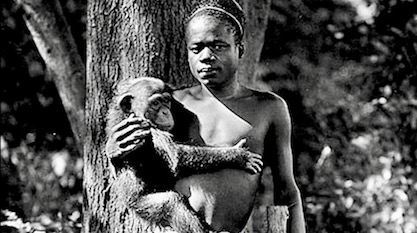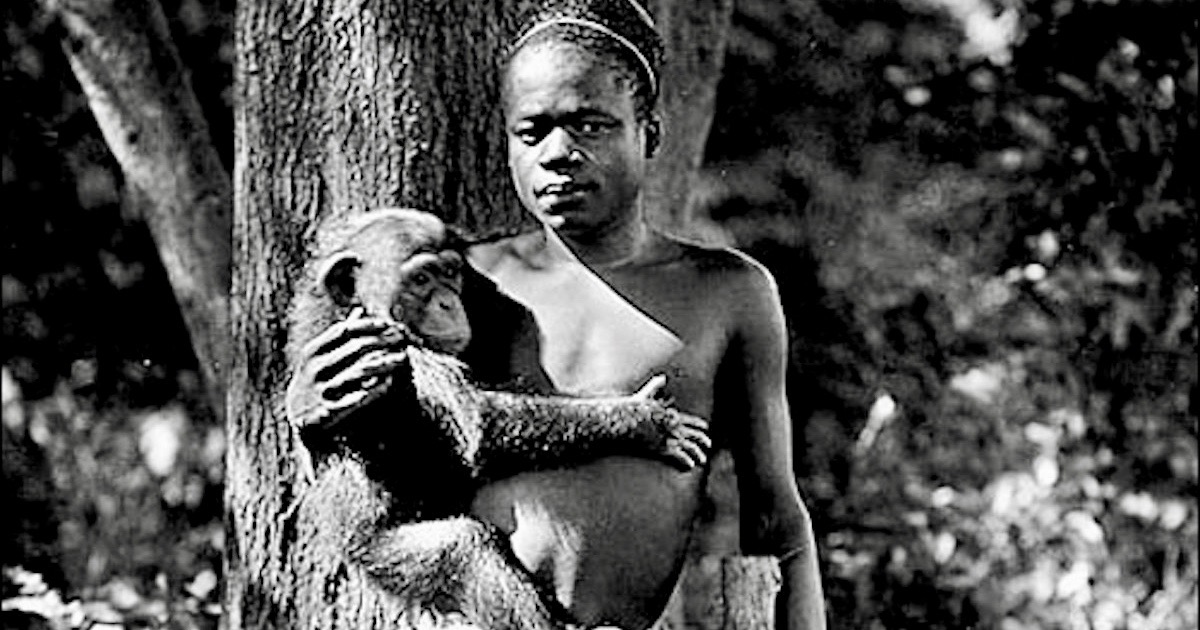 Culture & Ethics
Culture & Ethics
On Human and Animal Rights, the Twisted Course of Evolutionary “Philosophy”


Wesley Smith commented earlier on the struggle, via litigation by the Nonhuman Rights Project (NRP), to grant human-like “rights” to an elephant in the Bronx Zoo. The elephant they wish to liberate, Happy, is able to recognize herself in a mirror. No doubt she’s a wonderful and intelligent creature, and after the deaths of her two companion elephants, Grumpy and Sammy, the NRP points out that she is currently living by herself and it is not good that an elephant should be alone.
“It doesn’t matter how you imprison them, any normal elephant wouldn’t want to live in the Bronx Zoo,” the Nonhuman Rights Project’s founder and president, Steven Wise, said at a press conference at the zoo Tuesday.
Sounds Familiar
The Bronx Zoo…where was I reading about that institution recently? Oh yes, the Bronx Zoo and its Monkey House are where Ota Benga the African pygmy was imprisoned and displayed in 1906, like other indigenous peoples in exhibits elsewhere in the United States, as John West starkly recounts in the multiple award-winning documentary video Human Zoos: America’s Forgotten History of Scientific Racism. More background information on the subject is available at the Human Zoos website. You can find the documentary itself on Amazon or see it now on Amazon Prime Video.
Caging human beings was approved by the scientific and media elite of the time as being in keeping with evolutionary thinking about the hierarchy of biological races, with Africans at the bottom of the ladder, very close to apes as Charles Darwin taught. African-American and other clergy who protested the outrage were, in our contemporary parlance, the science-deniers of the day.
“Heady Stuff”
Not much more than a century later, the Nonhuman Rights Projects explains on their website how it’s precisely evolution that guides enlightened thinking about animal “rights.” Pushing for “chimpanzee rights,” they cite the writing of a group of philosophers arguing as amici curiae, before the New York Court of Appeals. “Philosophy can be heady stuff,” says Russell Tenofsky for the NRP. Yes, indeed!
The most basic and common reasoning for denying Tommy and Kiko a writ of habeas corpus seems to be that they are not homo sapiens. The history of philosophical thought points to this being a false construct. The philosophers argue in the amicus [brief] that evolutionary biology suggests that, because of similarity across species, variation among organisms within species, and evolution, “…there are no species essences, no set of properties both necessary and jointly sufficient for an organism to be a member of a particular species.” [Emphasis added.]
As the philosophers themselves put it:
Using species membership to determine who has legal status requires a justification of why species membership should be preferred over genus membership, which we share with Neanderthals and other hominins, or over family membership, which we share with chimpanzees and the other great apes. After all, the lesson of Darwinism is that there are no hard and fast distinctions among any of the categories in the Tree of Life, but only a nested organizational hierarchy.
From Absurdity to Absurdity
Isn’t it interesting how evolutionary philosophy, the “lessons of Darwinism,” evolves, from one malignant absurdity to another malignant absurdity. First, Darwinists defended keeping a man in a zoo. Now they want to free an elephant, from the same zoo. What remains consistent is the corroding of traditional ideas of human exceptionalism, and unique human dignity. The evil of displaying a man in a zoo Monkey House is, or should be, obvious. The Bronx Zoo dismisses the lawsuit on behalf of Happy as “ludicrous.” Sure it is, but as Wesley points out, it’s also “profoundly subversive,” and the thinking behind it is gaining ground:
Granting animals “rights” and declaring them “persons” would shatter the principle of human exceptionalism — which, of course, is the point — greatly eroding principles of universal human rights. In such a milieu, an individual’s moral value and rights would depend on their individual capacities of the moment rather than being intrinsic to the human condition.
The whole drive toward “animal rights” is part of a larger, twisted movement away from understanding human life as possessing a special value, worthy of defense, irrespective of “individual capacities of the moment.” That movement, likewise with its roots in the “lessons of Darwinism,” is not merely “ludicrous.” It’s also an increasingly powerful and respected justification for evil, as Wesley Smith has tirelessly shown.
Photo: Ota Benga in 1906, via Wikimedia Commons.
